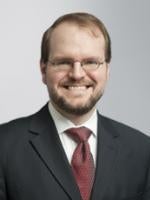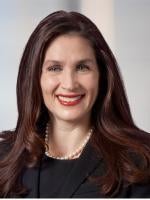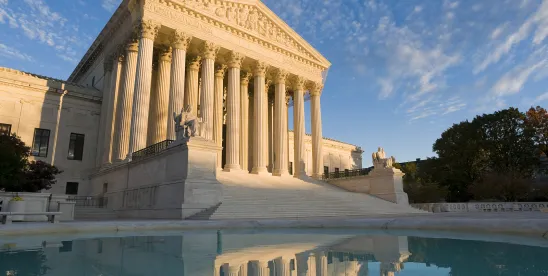On June 5, 2025, the United States Supreme Court (the “Court”) unanimously ruled in Catholic Charities Bureau, Inc. v. Wisconsin Labor and Industry Review Commission that a Catholic charity group was entitled to a tax exemption from the state’s unemployment fund, and that interpreting the statutory language to the contrary, as the lower court (defined below) decision did, would violate the First Amendment.
This decision overturned the ruling of the Wisconsin Supreme Court (the “lower court”) that denied tax exemption based on the nature of the group’s activities as being “secular in nature, not religious,” holding that the decision below resulted in unconstitutional “denominational discrimination.” Justice Sotomayor delivered the majority opinion. Justice Thomas and Justice Jackson separately concurred.
Background
Under Wisconsin law, employers are required to pay into the state’s unemployment compensation program through payroll taxes.[1] There is an exemption for certain nonprofit organizations, including religious employers that are “operated primarily for religious purposes” and “operated, supervised, controlled, or principally supported by a church or convention or association of churches.”[2]
Petitioners in the case include the Catholic Charities Bureau, a nonprofit affiliate of the Roman Catholic Diocese of Superior, and its four sub-entities. They provide charitable services to local communities in Wisconsin, such as employment training and daily assistance to people with disabilities. They do not engage in “proselytization,” and they employ and serve people of all religious faith.
Petitioners sought a tax exemption under the relevant provisions and were rejected for not being “operated primarily for religious purposes.” The lower court affirmed the rejection, stating that petitioners’ activities are not typically religious because, among other things, they did not restrict charitable services to Catholics, nor did they attempt to proselytize or engage in any other activities that were not secular in nature.
The Decision
The Court unanimously overturned the lower court, in an opinion written by Justice Sotomayor. The Court concluded that the lower court’s interpretation granted “denominational preference” to religious organizations based on theological practices—such as whether to proselytize as part of the provision of other services or whether to only serve co-religionists. This “denominational discrimination” among religions, the Court reasoned, was presumptively unconstitutional under longstanding precedent under the religion clauses of the First Amendment, and could only be upheld if justified by a compelling governmental interest and if the discrimination was closely fitted to further such interest[3]—a test that the Wisconsin Labor & Industry Review Commission failed to meet.[4]
Justice Thomas and Justice Jackson both had separate concurring opinions. Justice Thomas’s opinion criticized the lower court’s conclusion that the Catholic Charities organization should be viewed as separate from the associated Catholic Diocese of which they are a part. Justice Jackson’s opinion agreed with the Court’s opinion with respect to the application of the “denominational discrimination” test to the decision below, but wrote to explain her views as to the reading of the similar exemption under the Federal Unemployment Tax Act (“FUTA”). Justice Jackson argued that a pure functional analysis of the relevant tax exemption was appropriate. In other words, it is entirely appropriate to analyze what an organization does to determine the eligibility for the relevant tax exemption, regardless of its motive or inspiration. Although not entirely clear, it is possible that Justice Jackson would agree that organizations such as the petitioners here could be denied tax exemptions under FUTA as long as organizations with other theological approaches (such as more active proselytization) were also denied tax exemptions.
Discussion
Given the very specific and narrow tax exemptions at issue, and the particularities of the lower court’s decision with respect to the lines it was drawing with respect to different types of religious organizations, it is possible that the opinion in this case will have a relatively narrow impact. The opinion does emphasize, at the very least, that when analyzing the scope of religious exemptions or religion-specific tax provisions, courts and practitioners need to be aware that drawing lines that benefit certain theological traditions over others could bear special scrutiny. A parsonage allowance with a limited scope only applicable to the ministers of certain religious traditions, or a real property exemption that only applies to religious land usages that have specific theological features, could be subject to searching review. That said, it is always difficult to predict how the Court will apply the principles of a decision interpreting the First Amendment in other cases with substantially different facts.
Summer Associate, Zhizhou (Josie) Liu, assisted with writing this post.
[1] Wis. Stat. §108.17-18.
[2] Wis. Stat. §108.0215(h)(2).
[3] Larson v. Valente, 456 U. S. 228, 246–47 (1982); Epperson v. Arkansas, 393 U. S. 97, 106 (1968); Zorach v. Clauson, 343 U. S. 306, 314 (1952).
[4] The Court noted that Wisconsin could not explain why an organization which did not proselytize and served all-comers was more at-risk to leave employees without unemployment benefits as compared to an organization that did so. Wisconsin’s exemption was also found to be underinclusive: organizations that did the same work as the petitioners but directly by a church or the ministers itself could be exempted. Additionally, the exemption did not draw distinctions between religious and non-religious employees, which was further evidence of the lack of a close fit between asserted government interest and the scope of the exemption.




 />i
/>i

